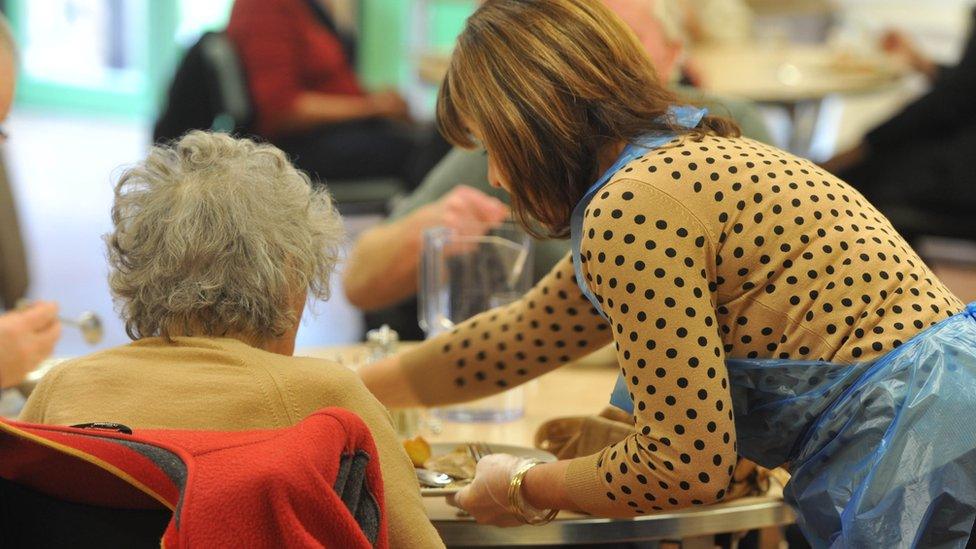Nursing homes 'closing each week'
- Published

Nursing homes are closing at the rate of at least one per week in England, due mainly to a shortage of nurses, official figures suggest.
It means the number of nursing homes and nursing beds has fallen for the first time in five years.
A total of 73 homes cancelled their registration in the first six months of 2016, the Care Quality Commission said, partly due to recruiting problems.
The Department of Health said nurse training places were being increased.
In the year 2015-2016, the number of nursing homes in England fell from 4,697 to 4,633 and the number of their beds reduced from 224,674 to 224,026, reversing the increase seen over the previous five years.
And 73 homes cancelled the element of their registration that is required to operate as a nursing home in the first half of 2016, compared with 72 in the whole of 2015.

The BBC has produced an online guide to the system which shows how it works and how much care costs wherever you live in the UK.
Find out the cost of care in your area

Andrea Sutcliffe, chief inspector of adult social care at the CQC, told BBC Radio 4's You and Yours programme, said: "One of the fundamental reasons is that we are seeing that homes are having difficulty recruiting and retaining nurses.
"There are about 47,000 nurses working in adult social care. There is about a 9% vacancy rate, which will mean they are depending on agency nurses. And over the last year a third of nurses left their job.
"So, we're having difficulty recruiting them and then we are having difficulty retaining them, and that will have a direct impact on the quality of care that people are receiving."
'Difficulties with funding'
The regulator changed the way it carried out inspections in 2014, and care homes are now judged on whether they are 'safe, effective, caring, responsive, and well-led.
The CQC said: "The quality of nursing home care continues to be rated lower than other adult social care services."
It said 40% are currently rated as either "requiring improvement" or "inadequate", with 60% rated "good" and 1% "outstanding".
But Frank Ursell, of the Registered Nursing Home Association, is predicting the number of closures will get worse.
"[This] ought to be concerning because the demography is telling us we have got an ageing population," he said.
"We've never had any control over the supply of nurses. so we've always had to rely upon the supply of nurses that are trained by the NHS.
"If the number of nurses they're training isn't sufficient to meet both the health and social care needs then we are going to have a problem. "
The Department of Health said it was funding a £40m leadership programme to create more senior nurses, as well as undergraduate nurse apprentices and student nurse placements in care homes.
But, many home owners cannot wait that long, with a range of factors - including reduced CQC ratings -putting potential residents off, and making the business unsustainable.

Home owner Andrew Uter recently shut his nursing home in Bath after 32 years.
He said: "We decided to close our home for a variety of reasons. I think one of the main reasons homes are closing nowadays is due to staffing difficulties, but also to some extent regulatory difficulties and difficulties with funding.
"The struggle over the last few years with those elements has become so much that we felt it better for our size, a smaller more intimate home, to close and to move on.'
'First of all we recruited through an agency from Spain, but in the end we had to go further afield and we went to agencies in Portugal. We also tried to recruit from India and the Philippines."
Often however, candidates would get a better offer elsewhere and not accept the job.
Mr Uter's nursing home was rated as "requiring improvement" and then "inadequate", and he says being told to roster on four nurses overnight was "the straw that broke the camel's back".

Agency rates are higher than staff rates. An agency nurse might typically get £22 an hour, the agency fee is £28 and so the nursing home would be paying a total of £50 per hour.
The pressure on the sector has seen a number of key players reducing or cutting their nursing beds.
HC-1 the third largest care home company in the UK say nursing shortages have been a contributing factor in the fate of 12 of their homes which they have either closed or turned into residential homes.
Fees increased
Anchor, the not-for-profit operator said it has pulled out of running nursing homes altogether to focus on retirement housing, assisted living and residential care.
Avery Healthcare at the more luxury end of the market has reduced its 3,000 nursing beds by about 20% with more reductions expected.
And Four Seasons Care, which is the UK's biggest provider, needs 4,000 nurses on its books, but it is currently 700 nurses short.
Health Education England recently announced a new Nursing Associate role, and some care providers are dealing with the nursing shortage by starting their own training schemes to improve senior care workers' skills.
Funding remains a key problem for nursing homes owners.
The Department of Health has recently raised the NHS-funded Nursing Care Rate in England.
It is a fee paid to care homes looking after people receiving nursing care. The rate rose from £112 per week to £156.
Many care providers say that's about half what it costs to pay nurses to provide nursing care.
- Published4 May 2016

- Published19 November 2015

- Published13 September 2016













